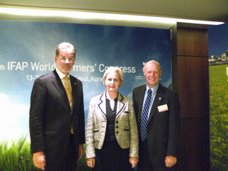The support by SCC to cooperatives in Kenya, illustrates the potential of small cooperatives to contribute to input supply, market linkages and especially improved market payments for small scale farmers, influencing positively their incomes. The example also illustrates how working with cooperatives has advantages for farmers to cope more quickly and in a sustainable way with difficult external circumstances.
“The project has supported 43 primary agricultural cooperatives, 15 small scale farmers organisation and 15 youth groups between 2006-2009. About 6.300 direct beneficiaries are participating via the cooperatives, of which about 43% women. The support of SCC contributes to organisational strengthening of the cooperatives, and to more and better service delivery to the members by the cooperatives. More specifically, a participatory monitoring and evaluation system was strengthened and the professional capacity of cooperatives for democratic principles and for service delivery (market related) to members was built. Also measures to strengthen the accountability towards members have been taken. For the members of the cooperatives, this resulted in improved and more diversified services to members and in better payments for their products by the cooperatives. For example, the price paid for milk for members of the Kyumbi dairy association increased with 30%. This took place thanks to higher market prices generally, but also thanks to the fact that the cooperative started to produce yoghurt and linked the members to lucrative markets. Not only prices for farmers increased, but their profitability was further increased by collective supply of inputs for farmers, combined with raising awareness on environmental issues. This type of progress has been translated in an income increase for the members of 46%, despite drought and political violence in Kenya. Still, the example of SCC in Kenya illustrates that working with farmer organisations has the advantage of being close to the analysis of effects by farmers and of working close to farmers to introduce new strategies. Climate changes have quite suddenly introduced longer drought spells in Kenya. Apart from directly introducing drought resistant crops and testing drip irrigation, the project is also able to link the cooperatives directly better to surrounding research institutions in order to search continuously new solutions with them.”
Wednesday, August 8, 2007
Subscribe to:
Post Comments (Atom)
Check these interesting contributions from other sites & blogs
- On Farmers Organization in Egypt
- Law on farmers Organizations in China
- Interview with FAO officials on Farmers Organizations
- Farmers use mobile phones
- comment of Kees Blokland on anti-CAP campaigning
- Poverty & growth blog of the World Bank
- Gapminder statistics visualized
- Guide for implementing ICT projects - iCommons december 2006
- Africa: tools of liberalisation - Patricia Daniel, University of Wolverhampton, England
- Business and the rural poor - Harvard Business School
- Profiling Asian Farmers Association members - Jan 4th, 2007
- Fiji Times report on AgriCord grants to Sugar Farmers - January 04, 2007
- Increasing Impact - marrying micro-credit and micro-insurance - The disconfort Zone, january 4th, 2007
- Programs that Fight Poverty - Institute for Advanced Technologies in Global Resilience - November 17, 2006
- University of Chicago Press Journals reports on GMOs - January 25, 2007
- Biotech crops to help reduce poverty - Kauser A Malik, in the Daily Times (Pakistan) January 25, 2007
- Why does China grow so fast - Michael Spence The Wall Street Journal 23 january 2007






No comments:
Post a Comment